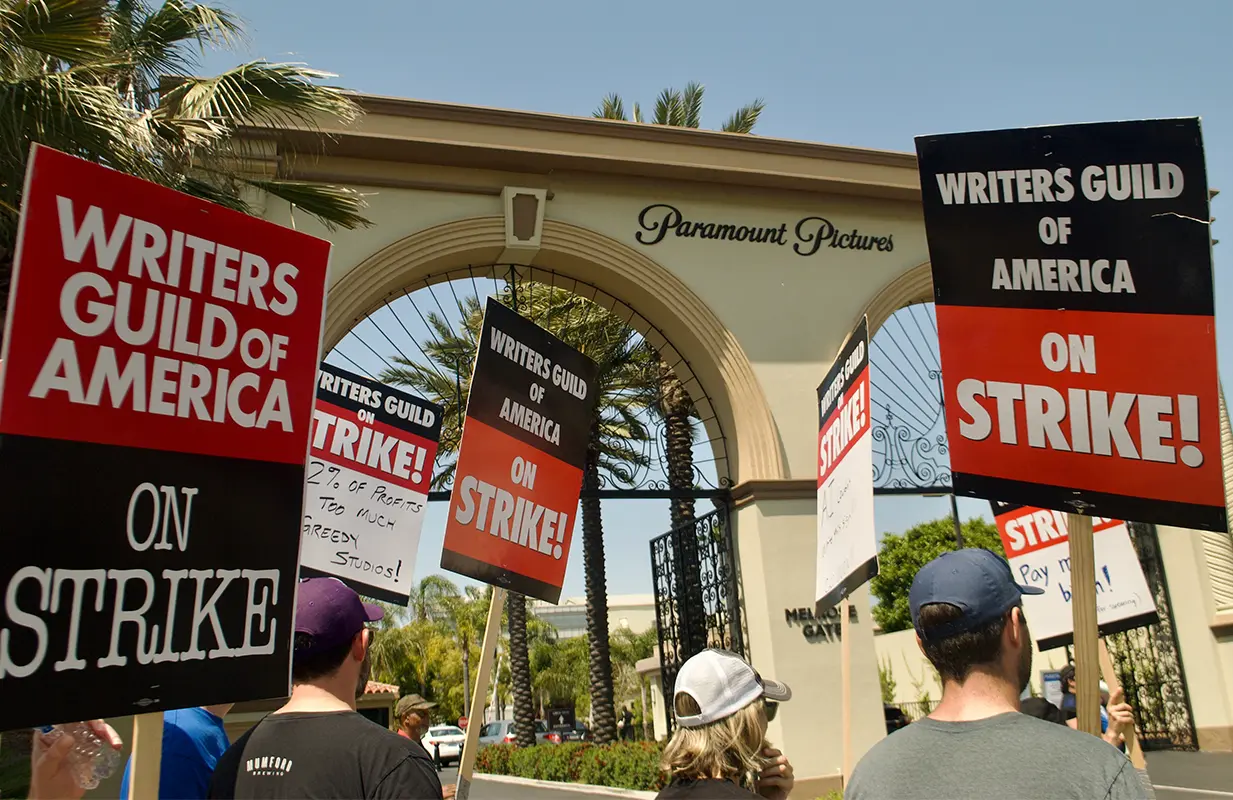UPDATED: Writers Strike Ends After Guild Approves Agreement With Hollywood Studios
-
 WGA picketers outside Paramount Pictures (Photo: WGA)
WGA picketers outside Paramount Pictures (Photo: WGA)UPDATED WEDNESDAY, SEPTEMBER 27, 9:30 AM ET: The Writers Guild of America strike has officially come to an end as of 12:01 AM PT on Wednesday. WGA leadership voted to lift the strike order two days after its Negotiating Committee and the Alliance of Motion Picture and Television Producers (AMPTP) announced a tentative deal on Sunday, 146 days after the guild halted all work on May 2.
Next, the WGA's 11,000 members will vote to ratify the new contract. However, writers do not need to wait for the final ratification vote, which is expected to take place from October 2–9, to return to work; according to Variety, they can resume work in writers' rooms and independently beginning Wednesday.
On Tuesday night, the WGA released the terms of the three-year deal, revealing big wins on contentious points such as minimum staff levels in writers' rooms and protections surrounding the use of artificial intelligence. The new contract guarantees increased pay for more junior staffers (and thus access to health insurance), establishes a structure for a "viewership-based streaming bonus," and takes steps to preserve the writers' room by instituting minimums based on episode count, among other deal points.
The tentative deal came after the WGA and the AMPTP resumed negotiations on September 20 and, with key executives including Netflix co-CEO Ted Sarandos, Disney CEO Bob Iger, and Warner Bros. Discovery CEO David Zaslav in the room, worked toward a resolution over the course of five consecutive days.
Getting back to the negotiating table was difficult, in large part due to stubbornness on behalf of the AMPTP, which waged an unsuccessful media battle against the writers. After the strike began in early May, the two sides did not meet for months; the lack of communication was part of the AMPTP's initial strategy to "allow things to drag on until union members start losing their apartments and losing their houses," as a studio executive told Deadline in July. The following month, the AMPTP issued a counteroffer that the WGA claimed contained many "limitations and loopholes and omissions," including a proposal that would delay the discussion about viewership-based residuals (one of the guild's main deal points) until 2026. At that point, bargaining stalled again until mid-September, when the sides announced plans to come back to the negotiating table.
While the WGA has struck a deal with the AMPTP, ending the union's largest work stoppage since the strike of 1988 (which lasted 154 days), SAG-AFTRA remains engaged in a labor dispute with the studios. Hollywood actors have been on strike since July 14; the sides have not resumed discussions, but SAG-AFTRA has said their "negotiating team remains ready at a moment's notice to go back to the bargaining table to secure a righteous deal." Now that the WGA has won a fair contract, it's likely AMPTP will offer concessions to SAG-AFTRA, which has expressed its own concerns about streaming residuals and the use of AI.
Claire Spellberg Lustig is the Senior Editor at Primetimer and a scholar of The View. Follow her on Twitter at @c_spellberg.
TOPICS: TV Writers' Strike, Netflix, AMPTP, Apple, Disney, NBC Universal, Paramount Global, Warner Bros. Discovery, Writers' Guild, Writers Guild of America